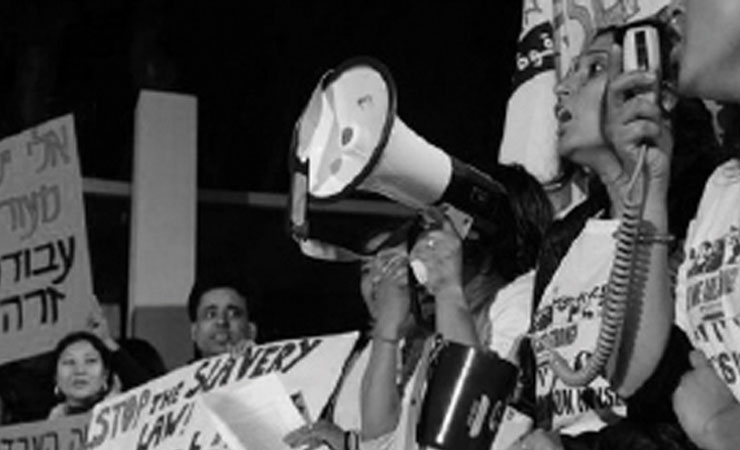On Monday, November 18th 2013, the High Court of Justice appeal hearing took place regarding one of Kav LaOved’s most long-running cases: inclusion of “veteran” caregivers (those who have legally resided in Israel for extensive periods of time) in the National Health Insurance Law and National Insurance Institute (NII) Law. It will be the last stage of a process that has continued over the last eight years.
The appeal was originally presented by Yuval Livnat, the previous legal advisor of Kav LaOved, at the beginning of 2006. An inter-ministerial committee was established following the appeal, as well as other appeals relating to the social rights of non-residents. The purpose of the committee was to make recommendations about the possibility of bestowing social rights entitled to residents according to the National Health Insurance Law and the NII Law to different groups of people not formally considered residents, but have resided in Israel for extensive periods of time.
After years of inactivity, the committee recommended not to bestow social rights according to the laws to “veteran” migrant workers. After an appeal discussion in September 2012, the court recommended the state to consider the possibility of affording these rights to migrant caregivers who have resided in Israel over 10 years. The issue returned to the committee, and again this time they recommended not to change the current situation. Migrant caregivers, even if they have resided in Israel for decades, are still considered “temporary,” according to the committee’s stance, and thus it is not justifiable to include them in “common good” mechanims embodied by the National Health Insurance Law and the NII Law, which are meant for individuals with the intention of remaining in the country.
Kav LaOved’s response, which has been submitted to the court, requests a reply to this aforementioned claim and other claims present in the committee’s recommendation. Included in Kav LaOved’s response are affidavits of migrant caregivers who have resided in Israel for extensive periods. The most “veteran” of these caregivers has resided in Israel “temporarily” for 21 years.
The High Court deliberation was long, and a ruling is yet to be announced. The discussion included the panel questioning the state representative regarding the arrangement in the foreign workers’ directive that in the case a worker whose capacity to work has been revoked for 90 days or more, the worker completely loses his/her right to health insurance. One member of the panel commented that these scenarios are exactly when there is need for protection, when the needy worker who has legally stayed here for years loses the right to medical treatment. The state claimed that Kav LaOved is trying to impose an obligation to allow “medical settling” of migrant workers indefinitely, and the question is whether the state has a duty to allow this type of “settling.”
Kav LaOved clarified that this is not the question the appeal is presenting, but rather that the court is being asked to determine whether the current arrangement provides protection that meets constitutional law regarding the rights to health and social security of migrant workers.


